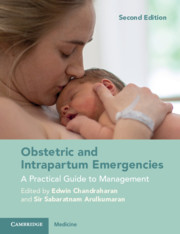Book contents
- Obstetric and Intrapartum Emergencies
- Obstetric and Intrapartum Emergencies
- Copyright page
- Contents
- Contributors
- Preface
- Preface to the First Edition
- Acknowledgements
- Section 1 General Principles
- Section 2 Algorithms for Management of the Top Five ‘Direct Killers’
- Section 3 Intrapartum Emergencies
- Section 4 Postpartum Emergencies
- Chapter 18 Acute Puerperal Uterine Inversion
- Chapter 19 Sudden Postpartum Maternal Collapse
- Chapter 20 Retained Placenta
- Chapter 21 Perineal Trauma
- Section 5 Medical and Surgical Emergencies During Pregnancy
- Section 6 Anaesthetic Emergencies During Pregnancy
- Section 7 Neonatal Emergencies and the Management of Immediate Neonatal Problems
- Section 8 Management of Anticipated and Non-anticipated Emergencies in Pregnancy
- Section 9 Setting-Up Skills and Drills Training in Maternity Services and Reducing Avoidable Harm
- Index
- References
Chapter 19 - Sudden Postpartum Maternal Collapse
from Section 4 - Postpartum Emergencies
Published online by Cambridge University Press: 06 May 2021
- Obstetric and Intrapartum Emergencies
- Obstetric and Intrapartum Emergencies
- Copyright page
- Contents
- Contributors
- Preface
- Preface to the First Edition
- Acknowledgements
- Section 1 General Principles
- Section 2 Algorithms for Management of the Top Five ‘Direct Killers’
- Section 3 Intrapartum Emergencies
- Section 4 Postpartum Emergencies
- Chapter 18 Acute Puerperal Uterine Inversion
- Chapter 19 Sudden Postpartum Maternal Collapse
- Chapter 20 Retained Placenta
- Chapter 21 Perineal Trauma
- Section 5 Medical and Surgical Emergencies During Pregnancy
- Section 6 Anaesthetic Emergencies During Pregnancy
- Section 7 Neonatal Emergencies and the Management of Immediate Neonatal Problems
- Section 8 Management of Anticipated and Non-anticipated Emergencies in Pregnancy
- Section 9 Setting-Up Skills and Drills Training in Maternity Services and Reducing Avoidable Harm
- Index
- References
Summary
This is the most common cause of maternal collapse in the immediate postnatal period, and in the most recent MBRRACE report, the number of maternal deaths as a result of this has risen from 13 to 21 in the last triennium [1]. Postpartum haemorrhage (PPH) occurs following approximately 1%–5% of deliveries. Primary PPH is defined as more than 500 mL of blood lost from the genital tract with 24 hours of delivery and is categorised as minor (500–1000 mL) and major (>1000 mL). A loss of more than 2000 mL of blood is often classed as massive postpartum haemorrhage and is often audited [2]. The causes of primary PPH can be remembered as ‘the 4 T’s’ – tone, trauma, tissue and thrombin. Secondary PPH occurs after 24 hours of delivery and is attributable mostly to retained products of conception (placental fragments) and endometritis.
- Type
- Chapter
- Information
- Obstetric and Intrapartum EmergenciesA Practical Guide to Management, pp. 139 - 146Publisher: Cambridge University PressPrint publication year: 2021



